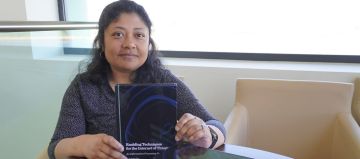‘Enabling Techniques for the Internet of Things’ focuses on the transformative technologies that drive IoT such as Digital Twins and Artificial Intelligence
Walton Institute’s Head of Programmable Autonomous Systems Division, Dr Indrakshi Dey, has released a new book, Enabling Techniques for the Internet of Things, in collaboration with Cambridge Scholars Publishing. This publication serves as a valuable resource for students, researchers, and industry practitioners working in the rapidly evolving field of the Internet of Things (IoT). It provides an in-depth exploration of critical information processing techniques essential for enabling IoT while examining emerging applications and future challenges.
The book delves into transformative technologies that drive IoT, including Digital Twins, Artificial Intelligence (AI), the Metaverse, the Internet of Senses, and the Internet of Everything. These advancements have significant implications across various domains, from personalised healthcare and smart cities to enhanced gaming experiences and industrial automation. By making complex IoT concepts more accessible, Dr Indrakshi aims to bridge the gap between cutting-edge research and practical applications.
“This book is essentially a guide to understanding how to make sense of all the data from those smart devices you hear about,” explains Dr Indrakshi.
“This book is essentially a guide to understanding how to make sense of all the data from those smart devices you hear about,” explains Dr Indrakshi. “It talks about things like how to combine information from different sources, clean up noisy signals, and make decisions based on what the devices are telling us. It also looks at different types of IoT, like those used in homes, cities, and industries, and discusses the technologies that make each type work.”
Impact on Key Industries
Dr Indrakshi’s research has the potential to transform multiple industries by improving IoT information processing techniques. Key areas of impact include:
- Healthcare: Machine learning algorithms can analyse data from wearable sensors to identify potential health risks, leading to more personalized treatment plans and timely medical interventions.
- Industrial Automation: Digital Twin technology enables the creation of virtual replicas of physical assets, allowing manufacturers to optimize production processes, anticipate equipment failures, and improve efficiency.
- Smart Cities: IoT devices can gather real-time data on traffic flow, energy consumption, and environmental conditions to optimise urban infrastructure, reduce energy waste, and enhance air quality.
- Environmental Monitoring: IoT sensors can track changes in ecosystems, monitor pollution levels, and detect natural disasters, providing crucial insights for conservation efforts and emergency responses.
Future Directions of IoT Research
The book also explores the next frontier of IoT applications. As Digital Twins become more integrated with IoT, industries will be able to simulate complex systems for enhanced risk management and efficiency. AI-driven IoT solutions will enable smarter decision-making, revolutionising sectors like healthcare, where AI-powered devices can deliver precision medicine and predictive diagnostics.
Furthermore, the Metaverse and the Internet of Senses are set to redefine immersive experiences, blending IoT with virtual and augmented reality to enhance gaming, retail, and remote collaboration. The Internet of Everything (IoE) envisions a seamlessly interconnected world where devices, people, and data interact in unprecedented ways, unlocking new opportunities for innovation and sustainability.
A Comprehensive Guide to IoT Technologies
Enabling Techniques for the Internet of Things offers a thorough examination of essential IoT concepts, covering data fusion, signal denoising, machine learning methodologies, graph signal processing, game-theoretic algorithms, and full-duplex communication techniques. The book also categorises IoT into distinct verticals—including Massive IoT, Broadband IoT, Critical IoT, and Industrial IoT—outlining the key enabling technologies for each category.
Dr. Dey’s latest publication stands as a significant contribution to the field of IoT, providing a roadmap for future research and development. By addressing both technological advancements and ethical considerations, the book underscores the importance of responsible and inclusive IoT deployment for the benefit of society as a whole.
Enabling Techniques for the Internet of Things is available through Cambridge Scholars Publishing HERE now.


